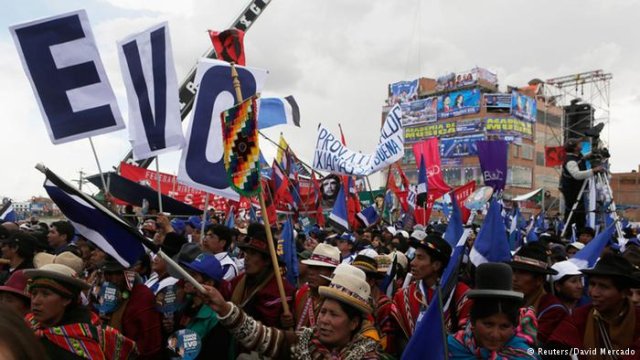
"This win is a triumph for anti-imperialists and anti-colonialists," Bolivia's left-wing President Evo Morales told thousands of supporters from the balcony of the presidential palace on the evening of October 12 after a crushing win in that's day's presidential poll, Reuters said.
Morales won his third term as president, Reuters said, "trouncing his opponents on a promise to consolidate socialist reforms that have vastly extended the state's reach into the natural gas-powered economy".
Reuters said: "A Mori exit poll released by Unitel television showed Morales, a prominent member of the bloc of socialist and anti-U.S. leaders in Latin America, winning 61 percent of the vote. His closest rival, [cement tycoon] Samuel Doria Medina, had 24 percent."
Morales was first elected as Bolivia's first-ever indigenous head of state in 2005 on the back of huge anti-neoliberal protests that had overthrown two presidents.
He was elected on a platform to nationalise the nation's gas industry and initiate a Constituent Assembly to draft a new constitution based on incorporating Bolivia's long-oppressed indigenous majority.
As well as implementing these key promises, reforms to nationalise key industries and redistribute wealth have lowered poverty. Land reform has also benefited thousands of campesinos (poor farmers).
As well as economic growth averaging about 5% a year, Reuters said: "Under Morales, the number of Bolivians living in extreme poverty has fallen to one in five from more than a third of the population of 10 million in 2006."
Polls indicate the Morales-led Movement Towards Socialist was likely extend its majority in Congress in Congressional elections held the same day.
See more background and gains under Morales in Ten reasons Evo Morales will be re-elected.
Like the article? Subscribe to Green Left now! You can also like us on Facebook and follow us on Twitter.